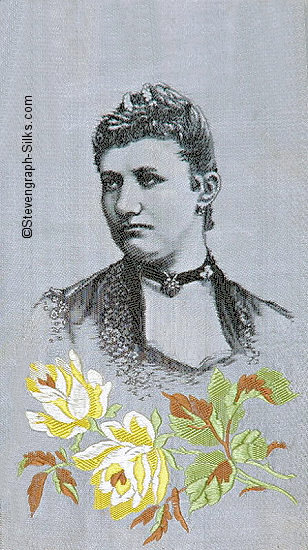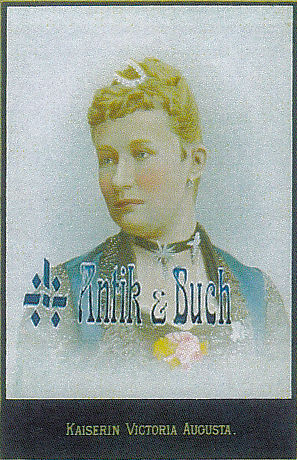|
|
un-mounted woven silk of Augusta Victoria
 |
original photograph of Augusta Victoria, with
enormous similarity to woven silk  photograph from un-known source, derived by member of the Stevengraph Collectors Association |
|
|
|
un-mounted woven silk of Augusta Victoria
 |
original photograph of Augusta Victoria, with
enormous similarity to woven silk  photograph from un-known source, derived by member of the Stevengraph Collectors Association |
|
| Reference Number:- | Sprake Number:- | Godden Number:- |
| so 71 | STG115 | image plate 163, top row right |
| Words: | Woven on silk:-
Printed at bottom of card-mount:- |
|||
| Size: | Card-mount:
cm deep by cm wide silk: | |||
| Comments: |
by Austin Sprake:
Sprake originally identified this silk as being that of Princess Hermine of Schonaich-Carolath, the second wife of Wilhelm II. by Geoffrey Godden: Other comments:
Augusta Victoria of Schleswig-Holstein was born on October 22, 1858 in Dolzig Palace in Sommerfeld, Prussia; the eldest surviving child of seven. Her father was Frederick VIII, Duke of Schleswig-Holstein-Sonderburg-Augustenburg; her mother, Princess Caroline Matilda of Wales, sister of King George III of Great Britain. She first met Prince Wilhelm of Prussia in 1868 when she was ten years old, and he only a few months younger than her. Wilhelm was the eldest child of the Crown Prince and Princess of Prussia (the future Kaiser Friedrich III and his wife Victoria, Princess Royal). Augusta Victoria and Wilhelm were re-acquainted in the summer of 1878 in Potsdam, Prussia, and they became engagement officially on June 2, 1880, and married on February 27, 1881 in Berlin. Augusta and Wilhelm had a very happy marriage. She had more artistic interests than he did, but they shared very conservative political views and a deep religious faith. The couple had seven children, six sons and one daughter. The year 1888 is called "The Year of Three Emperors" in German history. Wilhelm's grandfather Wilhelm I died on March 9, 1888 and was succeeded by Frederick III. Frederick was already gravely ill and lived only three months more, dying on June 15, 1888 when Wilhelm II succeeded to the throne, and Augusta became Empress of Germany (Kaiserin in German). Wilhelm lost his throne in the aftermath of World War I, and they went into exile in the Netherlands in 1918. Her health had started to fail though even before the exile, and she died on April 11, 1921. She had wanted to be buried in Germany, but this meant that Wilhelm would never be able to visit her grave. The German government agreed to the burial, but insisted that the special train that carried her coffin only travel at night and that there should be no announcement of the arrangements. Despite these conditions the 600-kilometer route through Germany was lined with people, and she was buried at the Temple of Antiquity which had been built by Frederick the Great. More than 200,000 people lined the route of the funeral cortege. There is now recorded three versions of Augusta Victoria (although it is still unknown why there are so many): 1. Augusta Victoria (body facing forward, head facing half left) - this version is mounted in a typical Stevens mount, but there is no weavers name. 2. The portrait above - Augusta Victoria (body facing half right, head facing half left) - this version is un-mounted. 3. Augusta Victoria, Empress of Germany - this portrait is mounted with the printed title. The research by members of the Stevengraph Collectors Association has identified an original photograph for comparison with the woven silk - as shown above. This photograph is almost identical to the silk, with her name, although unfortunately not dated. It is however unknown why it was never issued, or at least, why very few were issued.
|
| copyright |  |